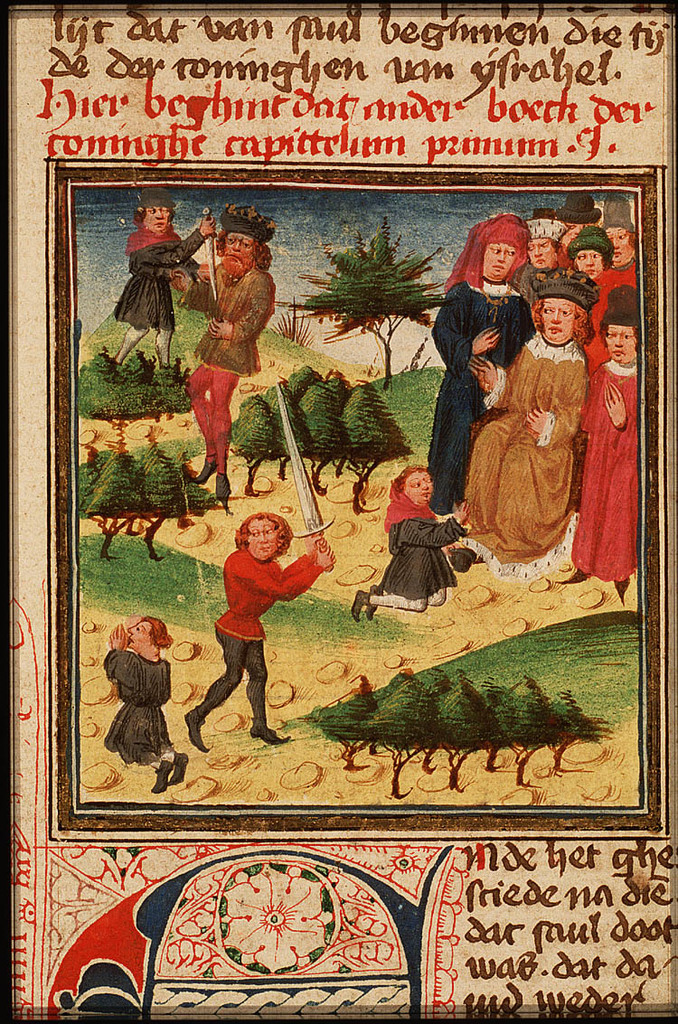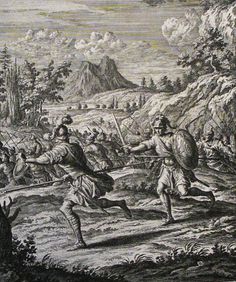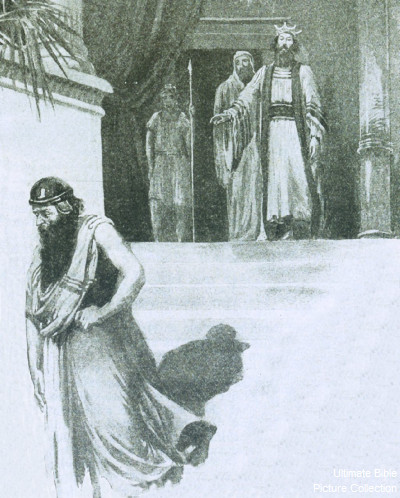The Sligo Presbyterian Church Wednesday Morning Bible Study is continuing its study of the Old Testament by looking at how God led David from watching a flock to leading a nation. Below is an outline for the series.
- Session 1 - 1 Samuel 1:1–4:1
- Session 2 - 1 Samuel 4:2–7:17
- Session 3 - 1 Samuel 8:1–10:27
- Session 4 - 1 Samuel 11:1–12:25
- Session 5 - 1 Samuel 13:1–15:35
- Session 6 - 1 Samuel 16:1–17:58
- Session 7 - 1 Samuel 18:1–20:42
- Session 8 - 1 Samuel 21:1–23:29
- Session 9 - 1 Samuel 24:1–26:25
- Session 10 - 1 Samuel 27:1–29:11
- Session 11 - 1 Samuel 30:1–31:13
- Session 12 - 2 Samuel 1:1–3:21
- Session 13 - 2 Samuel 3:22–5:10
- Session 14 - 2 Samuel 5:11–8:18
- Session 15 - 2 Samuel 9:1–11:27
- Session 16 - 2 Samuel 12:1–14:33
- Session 17 - 2 Samuel 15:1–18:8
- Session 18 - 2 Samuel 18:9–20:26
- Session 19 - 2 Samuel 21:1–24:25
During our twelfth session, we discussed what happened following the death of King Saul, 2 Samuel 1:1–3:21. Below is a recording of our discussion and the text from 2 Samuel.
2 Samuel 1:1–3:21 [New Revised Standard Version]
After the death of Saul, when David had returned from defeating the Amalekites, David remained two days in Ziklag. On the third day, a man came from Saul’s camp, with his clothes torn and dirt on his head. When he came to David, he fell to the ground and did obeisance. David said to him, “Where have you come from?” He said to him, “I have escaped from the camp of Israel.” David said to him, “How did things go? Tell me!” He answered, “The army fled from the battle, but also many of the army fell and died; and Saul and his son Jonathan also died.” Then David asked the young man who was reporting to him, “How do you know that Saul and his son Jonathan died?” The young man reporting to him said, “I happened to be on Mount Gilboa; and there was Saul leaning on his spear, while the chariots and the horsemen drew close to him. When he looked behind him, he saw me, and called to me. I answered, ‘Here sir.’ And he said to me, ‘Who are you?’ I answered him, ‘I am an Amalekite.’ He said to me, ‘Come, stand over me and kill me; for convulsions have seized me, and yet my life still lingers.’ So I stood over him, and killed him, for I knew that he could not live after he had fallen. I took the crown that was on his head and the armlet that was on his arm, and I have brought them here to my lord.”
Then David took hold of his clothes and tore them; and all the men who were with him did the same. They mourned and wept, and fasted until evening for Saul and for his son Jonathan, and for the army of the Lord and for the house of Israel, because they had fallen by the sword. David said to the young man who had reported to him, “Where do you come from?” He answered, “I am the son of a resident alien, an Amalekite.” David said to him, “Were you not afraid to lift your hand to destroy the Lord’s anointed?” Then David called one of the young men and said, “Come here and strike him down.” So he struck him down and he died. David said to him, “Your blood be on your head; for your own mouth has testified against you, saying, ‘I have killed the Lord’s anointed.’”
David intoned this lamentation over Saul and his son Jonathan. (He ordered that The Song of the Bow be taught to the people of Judah; it is written in the Book of Jashar.) He said: Your glory, O Israel, lies slain upon your high places! How the mighty have fallen! Tell it not in Gath, proclaim it not in the streets of Ashkelon; or the daughters of the Philistines will rejoice, the daughters of the uncircumcised will exult. You mountains of Gilboa, let there be no dew or rain upon you, nor bounteous fields! For there the shield of the mighty was defiled, the shield of Saul, anointed with oil no more. From the blood of the slain, from the fat of the mighty, the bow of Jonathan did not turn back, nor the sword of Saul return empty. Saul and Jonathan, beloved and lovely! In life and in death they were not divided; they were swifter than eagles, they were stronger than lions. O daughters of Israel, weep over Saul, who clothed you with crimson, in luxury, who put ornaments of gold on your apparel. How the mighty have fallen in the midst of the battle! Jonathan lies slain upon your high places. I am distressed for you, my brother Jonathan; greatly beloved were you to me; your love to me was wonderful, passing the love of women. How the mighty have fallen, and the weapons of war perished!
After this David inquired of the Lord, “Shall I go up into any of the cities of Judah?” The Lord said to him, “Go up.” David said, “To which shall I go up?” He said, “To Hebron.” So David went up there, along with his two wives, Ahinoam of Jezreel, and Abigail the widow of Nabal of Carmel. David brought up the men who were with him, every one with his household; and they settled in the towns of Hebron. Then the people of Judah came, and there they anointed David king over the house of Judah. When they told David, “It was the people of Jabesh-gilead who buried Saul,” David sent messengers to the people of Jabesh-gilead, and said to them, “May you be blessed by the Lord, because you showed this loyalty to Saul your lord, and buried him! Now may the Lord show steadfast love and faithfulness to you! And I too will reward you because you have done this thing. Therefore let your hands be strong, and be valiant; for Saul your lord is dead, and the house of Judah has anointed me king over them.”
But Abner son of Ner, commander of Saul’s army, had taken Ishbaal son of Saul, and brought him over to Mahanaim. He made him king over Gilead, the Ashurites, Jezreel, Ephraim, Benjamin, and over all Israel. Ishbaal, Saul’s son, was forty years old when he began to reign over Israel, and he reigned two years. But the house of Judah followed David. The time that David was king in Hebron over the house of Judah was seven years and six months. Abner son of Ner, and the servants of Ishbaal son of Saul, went out from Mahanaim to Gibeon. Joab son of Zeruiah, and the servants of David, went out and met them at the pool of Gibeon. One group sat on one side of the pool, while the other sat on the other side of the pool. Abner said to Joab, “Let the young men come forward and have a contest before us.” Joab said, “Let them come forward.” So they came forward and were counted as they passed by, twelve for Benjamin and Ishbaal son of Saul, and twelve of the servants of David. Each grasped his opponent by the head, and thrust his sword in his opponent’s side; so they fell down together. Therefore that place was called Helkath-hazzurim, which is at Gibeon. The battle was very fierce that day; and Abner and the men of Israel were beaten by the servants of David.
The three sons of Zeruiah were there, Joab, Abishai, and Asahel. Now Asahel was as swift of foot as a wild gazelle. Asahel pursued Abner, turning neither to the right nor to the left as he followed him. Then Abner looked back and said, “Is it you, Asahel?” He answered, “Yes, it is.” Abner said to him, “Turn to your right or to your left, and seize one of the young men, and take his spoil.” But Asahel would not turn away from following him. Abner said again to Asahel, “Turn away from following me; why should I strike you to the ground? How then could I show my face to your brother Joab?” But he refused to turn away. So Abner struck him in the stomach with the butt of his spear, so that the spear came out at his back. He fell there, and died where he lay. And all those who came to the place where Asahel had fallen and died, stood still. But Joab and Abishai pursued Abner. As the sun was going down they came to the hill of Ammah, which lies before Giah on the way to the wilderness of Gibeon.
The Benjaminites rallied around Abner and formed a single band; they took their stand on the top of a hill. Then Abner called to Joab, “Is the sword to keep devouring forever? Do you not know that the end will be bitter? How long will it be before you order your people to turn from the pursuit of their kinsmen?” Joab said, “As God lives, if you had not spoken, the people would have continued to pursue their kinsmen, not stopping until morning.” Joab sounded the trumpet and all the people stopped; they no longer pursued Israel or engaged in battle any further. Abner and his men traveled all that night through the Arabah; they crossed the Jordan, and, marching the whole forenoon, they came to Mahanaim. Joab returned from the pursuit of Abner; and when he had gathered all the people together, there were missing of David’s servants nineteen men besides Asahel. But the servants of David had killed of Benjamin three hundred sixty of Abner’s men. They took up Asahel and buried him in the tomb of his father, which was at Bethlehem. Joab and his men marched all night, and the day broke upon them at Hebron.
There was a long war between the house of Saul and the house of David; David grew stronger and stronger, while the house of Saul became weaker and weaker. Sons were born to David at Hebron: his firstborn was Amnon, of Ahinoam of Jezreel; his second, Chileab, of Abigail the widow of Nabal of Carmel; the third, Absalom son of Maacah, daughter of King Talmai of Geshur; the fourth, Adonijah son of Haggith; the fifth, Shephatiah son of Abital; and the sixth, Ithream, of David’s wife Eglah. These were born to David in Hebron. While there was war between the house of Saul and the house of David, Abner was making himself strong in the house of Saul.
Now Saul had a concubine whose name was Rizpah daughter of Aiah. And Ishbaal said to Abner, “Why have you gone in to my father’s concubine?” The words of Ishbaal made Abner very angry; he said, “Am I a dog’s head for Judah? Today I keep showing loyalty to the house of your father Saul, to his brothers, and to his friends, and have not given you into the hand of David; and yet you charge me now with a crime concerning this woman. So may God do to Abner and so may he add to it! For just what the Lord has sworn to David, that will I accomplish for him, to transfer the kingdom from the house of Saul, and set up the throne of David over Israel and over Judah, from Dan to Beer-sheba.” And Ishbaal could not answer Abner another word, because he feared him. Abner sent messengers to David at Hebron, saying, “To whom does the land belong? Make your covenant with me, and I will give you my support to bring all Israel over to you.” He said, “Good; I will make a covenant with you. But one thing I require of you: you shall never appear in my presence unless you bring Saul’s daughter Michal when you come to see me.” Then David sent messengers to Saul’s son Ishbaal, saying, “Give me my wife Michal, to whom I became engaged at the price of one hundred foreskins of the Philistines.” Ishbaal sent and took her from her husband Paltiel the son of Laish. But her husband went with her, weeping as he walked behind her all the way to Bahurim. Then Abner said to him, “Go back home!” So he went back. Abner sent word to the elders of Israel, saying, “For some time past you have been seeking David as king over you. Now then bring it about; for the Lord has promised David: Through my servant David I will save my people Israel from the hand of the Philistines, and from all their enemies.” Abner also spoke directly to the Benjaminites; then Abner went to tell David at Hebron all that Israel and the whole house of Benjamin were ready to do. When Abner came with twenty men to David at Hebron, David made a feast for Abner and the men who were with him. Abner said to David, “Let me go and rally all Israel to my lord the king, in order that they may make a covenant with you, and that you may reign over all that your heart desires.” So David dismissed Abner, and he went away in peace.
.jpg)






No comments:
Post a Comment